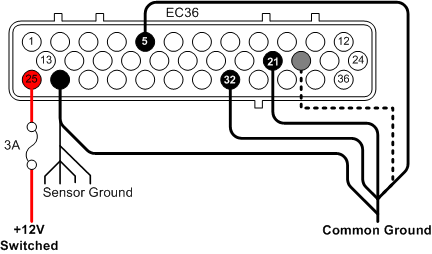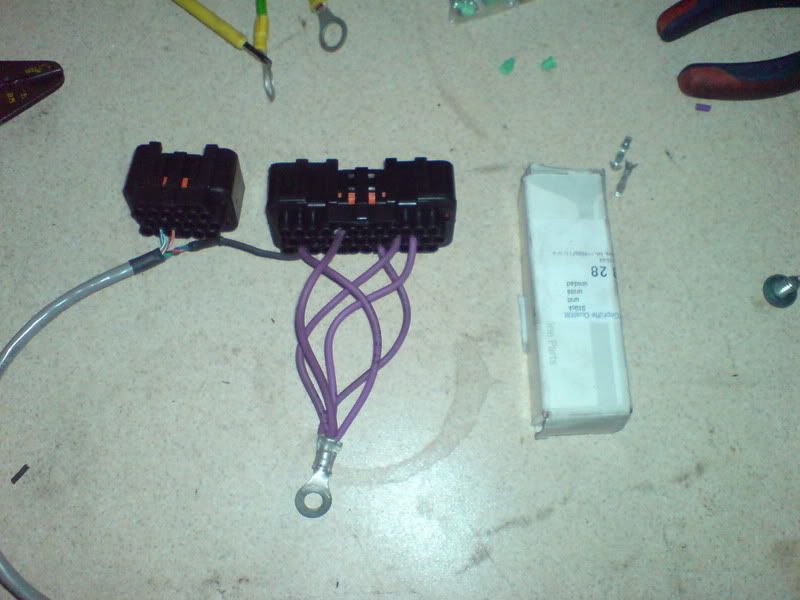[[Manual: Basics.Install.Mechanic]]
GND and GenBoard/Manual/DDFlyback are the most important things when playing with inductive loads, and several Ampere current. It's very easy to ruin hundreds (or thousands) EURO of equipments, and cause several days of extra debugging with bad (or lacking) connections.
Verify and measure every connection before powering up. Do NOT underestimate the importance of good grounding. Grounding well is cheap, but if doing sloppily, the learning price is high.
- all 4 GND5 (power-ground) pins must be connected to GND (EC36pin26) with short wires max 40cm (1.3 feet) from EC36 connetor to avoid damage caused by GND5 voltage jumping too high above GND (when ignition transformers, injectors or other loads are driven)
- EC36pin5
- EC36pin21
- EC36pin32
- EC36pin22 (assembled v3.x controller comes with EC36pin22 connected as GND5 ; it is recommended to do the same on customer-assembled controllers: connect EC36pin22 with a 0.5 .. 1mm2 wire to the GND5 near the IGBT-s; also short to EC36pin21)
- the sensors should be grounded to GND (EC36pin26) at the same point, or closer to EC36pin26
- sensors are grounded elsewhere would not ruin anything, but the signal would be noisy. Noise is unwanted and makes the VR trigger completely useless (engine won't start)
- after GND and GND5 are connected hard in the harness (some installers like to connect to a screw mounted on firewall; just make sure the screw doesn't come loose), the connected common-ground usually goes (with a thicker 1..2mm2 wire) to battery- (or other point can be OK).

as on MembersPage/PhatBob/UserGuide. Beware that insufficient instructions might be floating around (that required connecting GND and GND5 but allowed too long wires), use the above simple rules for safety of the controller; doing otherwise often results in several days of hunting for hard-to-track problems, avoid that.

Testing
- With ECM removed, on the EC36-wire connector, measure ohm between EC36-wire side GND5 pins (EC36pin5, EC36pin21, EC36pin32, EC36pin22) and the battery-. Must be very low, <=0.1 Ohm. Do this for all 4 GND5 connections.
- With ECM removed, on the EC36-wire connector, measure ohm between EC36-wire side GND pin EC36-pin26 and the battery-. Must be very low, <=0.1 Ohm
Why
- If all GND5 connections loose connectivity with GND (if they haven't been connected at all, or break due to a loose screw, or something) during engine (or WBO2) running, there is a huge problem, the board can be damaged.
- reasons to use many GND5 connections:
- if one breaks, HW will not be ruined
- high current capability of output drivers. Output current can be especially high with many low-z injectors and many ignition channels.
- GND and GND5 are not connected hard onboard v3.x (a weak, appr. 1 Ohm connection exist inside the TPIC6A259 aka. P259 chip)
- If GND and GND5 are connected hard onboard (eg. the GND-GND5 bridge that was applied for safety on unassembled v3.x until around 2005Q1 is not cut), the VR trigger signal can be noisy at very low RPM (cranking).
Verification
You just arrived to the site. They have the engine wired, and wires wrapped nicely
- according to your written instructions (in most cases prefer checklist to drawing)
- that you made after their documented measurements
- that were done according to your measurement-instructions (mostly Ohm-measurement of sensors and injectors)
They promise that the wiring perfectly matches the instructions. In general, for their benefit, you better not believe them: They worked helluva lot on the engine, and are very anxious to start and drive it. Your job is to slow them down and only allow the next step when there is reasonable confidence in safety. Most connections can be verified easily, mostly with the Ohm-meter and visual inspection.
You should also verify the grounds. The DVM is suitable for this, but not in a simple Ohm-meter mode. You need some higher load, like a 21W (or higher) lightbulb.
- disconnect the ECU if it was connected
- apply 12V to the lightbulb
- the ground of the lightbulb will be pulled down by the power
- this simulates that the outputs are loaded, like if injectors or ignition were drawing current
- do each GND5 output (EC36 pins 5,21,22 and 32), and
- measure DC 200mV on the just loaded GND5 with EC36pin26 as base
You will see that the loaded GND5 is appr 10..30mV higher than EC36pin26 GND. If the voltage is max 10..16 mV/A, than the ground connections are sufficient. For a 21W lightbulb (14V, 1.5A, 9.3 Ohm when hot) this means that anything higher than 1.5A * 16mV/A = 24mV must be redone, properly. If you measure less than 2mV, check if you measure properly (as that is very unlikely). 2 .. 15mV seems sufficient at this time. Make sure that they are made to last: no loose screws, temporary alligator-clips or other nastiness that could ruin the ground-system.
Note that this test only verifies that the GND5 is unlikely to divert dangerously from GND. It will NOT reveal if the trigger-ground is connected to the wrong place (which might inject noise to the trigger signal: mostly problematic with VR-sensor, cold-cranking, especially if the toothcount is 12-1 or less).
See also
- MembersPage/PhatBob/UserGuide for ground hints and drawing
- GenBoard/VerThree/Installation
- GenBoard/Manual/InitialTesting/VerThree